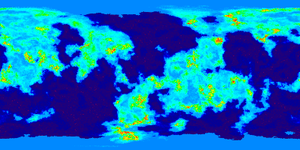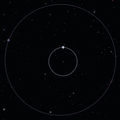Difference between revisions of "Kerbin/fr"
(→Galerie) |
(→Topographie) |
||
| Line 35: | Line 35: | ||
== Topographie == | == Topographie == | ||
[[File:Kerbin ISA Topo.png|left|thumb|Topographical image of Kerbin.]] | [[File:Kerbin ISA Topo.png|left|thumb|Topographical image of Kerbin.]] | ||
| − | Kerbin | + | Kerbin a environ la même proportion d'eau que de terre, avec des pôles glacial et des désert dispersé. Les montagnes ne dépassent généralement pas 3km d'altitude. Le point le plus élevé est 3750 m .<ref>http://kerbalspaceprogram.com/forum/index.php?topic=11388.msg176509#msg176509 {{broken link}}</ref> |
| − | |||
== Atmosphère == | == Atmosphère == | ||
Revision as of 16:02, 9 November 2012
Kerbin est la planète mère des Kerbals, on y trouve le Centre Spatial et toute les installation du Kerbal Space Program. Elle possède deux lunes nommées Mun et Minmus. C'est la 3e planète en orbite autour de Kerbol, une étoile de classe M. Elle est la troisième plus grosse planète en taille après Jool et Eve et le 4e objet céleste le plus imposant orbitant autour de Kerbol (la lune Tylo étant légèrement plus grande).
Contents
Topographie
Kerbin a environ la même proportion d'eau que de terre, avec des pôles glacial et des désert dispersé. Les montagnes ne dépassent généralement pas 3km d'altitude. Le point le plus élevé est 3750 m .[1]
Atmosphère
Kerbin has an atmosphere of unknown composition, though because Kerbin has plants and animals, it can be assumed there is O2, N2, and CO2. The atmosphere ends at roughly 69,078 meters and, as on Earth, becomes exponentially less dense as altitude increases (with a scale height of 5 km).[2] In general, the atmospheric pressure and density on Kerbin, at an altitude expressed in meters, are:
in kg/m^3
Orbites
Geosynchronous orbit is achieved at an altitude of 0,00 m (1008.9 m/s). A semi-synchronous orbit with an orbital period of 1/2 of Kerbal (3 hours or 10800 seconds) is achieved at an altitude of 0,00 m with an orbital velocity of 0,00 m/s.
Voyages Interplanétaires
From the lowest stable orbit around Kerbin (70 km), the amount of delta-V needed to reach the orbits of other celestials is as follows:
| Body | Delta-V | |
|---|---|---|
| Mun | ~860 m/s | |
| Minmus | ~930 m/s | |
| Eve | ~1033 m/s | |
| Duna | ~1060 m/s | |
| Moho | ~1676 m/s | |
| Jool | ~1915 m/s | |
Reference Frames
| Paid (0.17) | Demo (0.13.3) | |
|---|---|---|
| Rotational/Inertial transition | 100,000 m | 70,000 m |
| Warp | Minimum Altitude | |
| 1x | Any | |
| 2x | n/a | 0 m |
| 5x | 69,078 m (above the atmosphere) | |
| 10x | 69,078 m (above the atmosphere) | |
| 50x | 69,078 m | 150,000 m |
| 100x | 120,000 m | 300,000 m |
| 1,000x | 240,000 m | 600,000 m |
| 10,000x | 480,000 m | 1,200,000 m |
| 100,000x | 600,000 m | n/a |
Galerie
- NJ6qJ.jpg
La map aplatie de kerbin pendant la 0.14.2 et avant.
An accurate full-colour projection map of Kerbin as of 0.14.2 and above.
Mises à jour
- Improved atmosphere visuals.
- Minmus added.
- Much more varied and taller terrain added. Prior to this, some mountain ranges exceeded 600 m in height, but the tallest point was at an altitude of approximately 900 m.[3]
- Mun added.
- Terrain overhaul, oceans became wet.
- Atmosphere extended from ~34,500 m to ~69,000 m.
- Initial Release
Notes
- ↑ http://kerbalspaceprogram.com/forum/index.php?topic=11388.msg176509#msg176509 [Broken Link]
- ↑ Forum thread 16000, "[KGSS] Examining Kerbin's atmosphere"
- ↑ http://kerbalspaceprogram.com/forum/index.php?topic=6446.0 [Broken Link]







